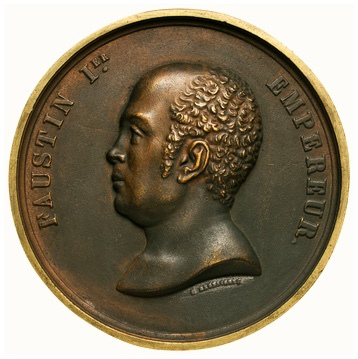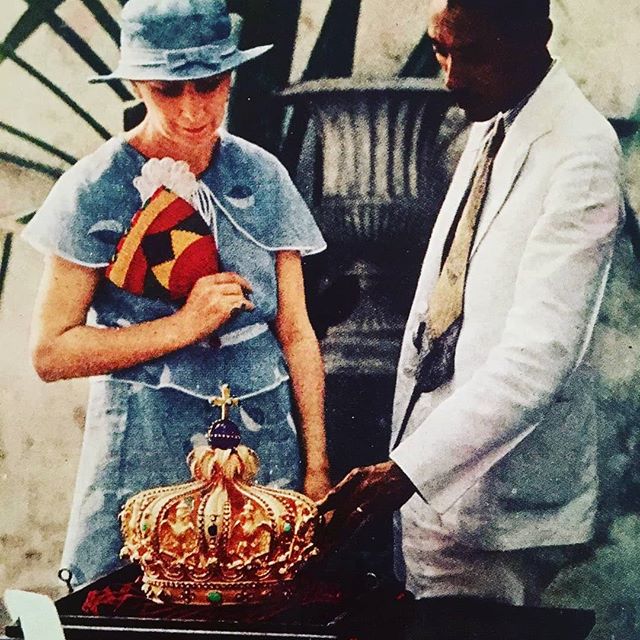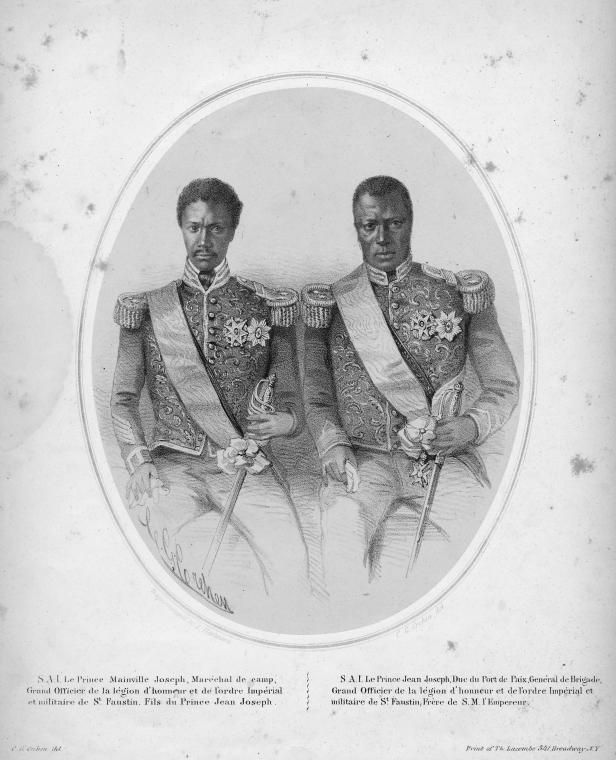
The order or line of succession is the sequence of members of a royal family in the order in which they stand in line to the throne. The basis for the succession is often determined in the nation’s constitution.
Legal basis of the succession
The legal basis for the line of succession at the time that it was in force, was the Constitution of 20 September 1849. The Constitution made the Imperial Dignity hereditary amongst the natural and legitimate direct descendants of Emperor Faustin I, by order of primogeniture and to the perpetual exclusion of females and their descendants. The Emperor could adopt the children or grandchildren of his brothers, and become members of his family from the date of adoption. Sons so adopted enjoyed the right of succession to the throne, immediately after the Emperor’s natural and legitimate sons (Les constitutions dHaiti, 1801-1885).
Art. 108. La dignité impériale est héréditaire dans la descendance directe, naturelle et légitime, de Faustin Soulouque, de mâle en mâle, par ordre de progéniture, et à l’exclusion perpétuelle des femmes et de leur descendance. Art, 109. — La personne de l’Empereur est inviolable et sacrée. Art. 110. — L’Empereur Faustin Soulouque est proclamé sous le nom de Faustin 1er. Art. 112. — L’Empereur pourra nommer son successeur, s’il n’a point d’héritier mâle et s’il n’a point de fils adoptif. Cette nomination devra être secrète et enfermée dans une cassette déposée au palais impérial de la capitale. (…) Art. 115.— A défaut d’adoption et de nomination par l’empereur, le grand conseil de l’Empire nomme son successeur. Jusqu’au moment où l’élection du nouvel empereur est consommée, le grand conseil exerce le pouvoir exécutif. Art. 134. — Les princes et les princesses de la famille impériale ne peuvent se marier sans l’autorisation de l’Empereur. Art. 135. — Les enfants mâles deviennent membres à vie du Sénat lorsqu’ils ont atteint l’âge de 18 ans. Art. 145. — Il est institué un grand conseil de l’Empire, composé de neuf grands dignitaires choisis par l’Empereur. L’Empereur préside le grand conseil ou en délègue le pouvoir à un de ses membres. Art. 146. — Les attributions du grand conseil sont : 1° D’exercer l’autorité exécutive dans le cas où il y aurait empêchement pour l’Empereur de l’exercer lui-même; 2° De nommer le successeur de l’Empereur et d’exercer le pouvoir exécutif dans les cas prévus par l’article 115; 3° D’élire le régent dans le cas de l’article 141; 4° D’être le conseil de la régence; 5° De procéder à l’ouverture de la cassette qui renfermera le nom du successeur de l’Empereur, conformément à l’article 112.
Genealogy
In order to see how the line of succession has developed, we have tried to make a fragment of the genealogy of the imperial family.
I. Marie-Catherine Soulouque. b. at Port-au-Prince, Saint-Domingue, 1744. A slave of the Mandingo race. She d. at Port-au-Prince, 9 August 1819.
IIa. H.I.M. Faustin-Élie Soulouque (Faustin I), by the grace of God , and the Constitution of the Empire, Emperor of Haiti. b. at Petit-Goâve, 1782. Freed by Felicite Sonthonax 29 August 1793. Fought in the War of independence as a private soldier 1803-1804, Cmsnd. as Lieut. and ADC to General Lamarre 1806, Lieut. Horse Guards under Presdt. Petion 1810, prom. Capt., prom. Maj. under Presdt. Rivière-Hérard, prom. Col. under Presdt. Guerier 1843, prom. Brig-Gen. and later Lt-Gen. and supreme commander of the guards under Presdt. Riche. Became President of the Republic of Haiti (*1) and took the oath of office 2 March 1847.

Proclaimed as Emperor Faustin I, by the Senate and the Chamber of Deputies, and assumed the style of His Imperial Majesty, 26 August 1849. Crowned at Port-au-Prince, by the Abbe Cessens according to Episcopalian (Franc-Catholique) rites, 18 April 1852. Attempted to conquer, but failed to take, Santo Domingo in 1856. Founded the Military Order of St Faustin and the Civil Haitian Order of the Legion of Honour, 21 September 1849. Also founded the Orders of St Mary Magdalen and St Anne, 31 March 1856. Deposed 15 January 1859.
Founded the Imperial Academy of Arts in 1856. Fled to the French legation, seeking asylum, but was later taken into exile in Jamaica, aboard a British warship 22 January 1859 (1). Married at Port-au-Prince, December 1849, H.I.M. Empress Adélina (b. ca. 1795), raised to the title of Empress of Haiti with the style of Her Imperial Majesty 26th August 1849, Crowned with her husband at Port-au-Prince 18th April 1852, daughter of Marie Michel Lévêque. After the death of her husband, Adélina fled to the Dominican Republic and then went to Spain, where she was received by the King of Spain himself. She remained at the Royal Palace of Spain in Madrid from 1868 to 1874.
Adélina then left for France and remained there from 1875 to 1877. She ended her days in Rome, Italy in 1879, until her death at the age of about 84 years. She was buried first in Rome near the Vatican and then in Haiti near her husband in 1907, 28 years after his death (*2).
Daughter: 1) H.I.H. Princess Célita Soulouque, m. Jean-Philippe Lubin, Count of Petionville, who was very rich. Together they had four children: three daughters and a son who died at birth. Adopted daughter: 2) H.S.H. Princess Geneviève Olive [Madame]. b. 1842 (quinze à seize ans in September 1858), d. 1936. Adopted by Emperor Faustin, raised to the title of Princess and granted the style of Her Serene Highness 1850. m. Amitié Lubin (b. ca. 1800), son of Jean Philippe Vil Lubin, Count de Pétion-Ville, by his wife, Elizabeth Ulcénie, née Amitié (*3). Princess Olive travelled around the world: France (1893-1894); Portugal (1894-1899) with her daughter Marie; Canada 1901; America (Philadelphia) (1902-1913); Dominican Republic (1913-1914); France (1914-1918); Dominican Republic (1918-1923); Thailand (1923-1927) as a guest of a friend of the Royal Family; Australia (1927-1929); Haiti 1929-1936) (*4) [Oliva Soulouque, Biografia].

IIb. (Prince) Jean-Joseph Soulouque. He d. after 1850, having had issue, eleven sons and daughters, including:
- H.I.M. (Prince) Mainville-Joseph Soulouque, pretender under the name Joseph I, m. 1854 with Princess Olive (IIa,2). He did participate in some attempts to restore the monarchy in Haiti, without success and d. in 1891. Children:
a. “S.A.S. la princesse” Maria Soulouque, d. Portugal 1899. b. H.I.M. (Prince) Joseph Soulouque, “prince impérial”, pretender to the throne as Joseph II, left for France with his mother in 1914, fought for the Allies in WWI, returned to the Dominican Republic in 1918 and lived there until his death on 18 June 1922. In 1930 Princess Geneviève Olive received a letter from the new pretender to the throne, her great grandson of 31 years told her that his wife was pregnant. Their names are unknown. c. “S.A.S. le prince” Faustin-Joseph Soulouque, lived in the United States (Philadelphia) until his death in 1913. d. Marie Adelina Soulouque, daughter of Mainville-Joseph Soulouque with Marie d’Albert. Daughter: Marie Adelina Soulouque, who married Johan Carl Sictus Weijgel Quast (*1), pharmacist [Santa Domingo].
Sources
(*1) Website of Chistopher Buyers
(*2) A deleted website: ayudamosconocer.
(*3) Roman Catholic Church Kingston (Jamaica) Marriages 1839-1869. Act of marriage: Pierre Joseph Amitie Vil Lubin, native of Haiti, lawful son of His Lordship Earl Philippe Vil Lubin and by his wife, Elizabeth Ulcénie. Lord Amitie Vil Lubin, maried on 26 December 1861 HSH Princess Geneviève Olive Soulouque, native of Haiti, lawful daughter of Emperor Faustin Elie Soulouque and Empress Adélina Lévêque. Witnesses: Alexandre Bravo, Charles Grant, widow Lubin, Amitie Lubin, widow of Louis Lubin, Elizabeth Grant, James Male, Jean Baptiste Vil Lubin, George Clermont, A.M. Lhoste, Felicite Faustin, Ameisima Amitie, Elina Mainvaille, L. Bedonet, Elizabeth Bourke, Caroline Crosswell. Source: website of Thierry Jean-Baptiste Soulouque Vil Lubin.
(*4) A deleted website: ayudamosconocer.
(*5) The Church of Jesus Christ of Latter-day Saints, “Pedigree Resource File,” database, FamilySearch (https://familysearch.org/ark:/61903/2:2:9HXC-TTG : accessed 2015-11-14), submitted by rcsimon2749685.
Note
There exists a family tree on MyHeritage, created by a person named Alan Horain. This family tree is totally unreliable. Some parts have been copied from Christopher Buyers’ website Royal Ark. Horain’s website has some real people but concocted most of it. Horain has made Faustin’s mother, Marie-Catherine Soulouque, a sister of Henry I. Impossible. She was a black slave born at Port-au-Prince, Saint-Domingue, 1744. Henry was born on Grenada, 6th October 1767 to Christophe, a freeman. Horain’s website tried to fudge the enormous age difference by giving her birthdate as 1755. Princess Françoise-Améthyste Henry and Princess Anne-Athénaïre Henry were taken to England by her mother in 1821 and settled in Italy in 1824, and domiciled at Pisa, 1831 and 1839 respectively. The family is mentioned in contemporary accounts in both places, so quite impossible to be in Haiti, having children with Faustin and Prince Jean-Joseph. The photographs of the people in the family tree are not real. The family tree is a misrepresentation and should be removed from MyHeritage.
Literature
- Alaux. Soulouque and His Empire: From the French of Gustave d’Alaux. 1861. Reprint. London: Forgotten Books, 2013. Print.
- Constitutions of the World from the late 18th Century to the Middle of the 19th Century, The Americas. Multi-volumed work Constitutions of the World from the late 18th Century to the Middle of the 19th Century Sources on the Rise of Modern Constitutionalism / Quellen zur Herausbildung des modernen Konstitutionalismus. Ed. by Dippel, Horst The Americas Vol. 10 Constitutional Documents of Haiti 1790–1860 / Documents constitutionnels d’Haïti 1790-1860 / Verfassungsdokumente Haitis 1790-1860 Ed. by Dubois, Laurent / Gaffield, Julia / Acacia, Michel
- Hartog, [dr.] Johan Curaçao; From Colonial dependence to autonomy. Oranjestad, Aruba: De Wit publishers 1968 (Faustin’s exile on the island of Curaçao)